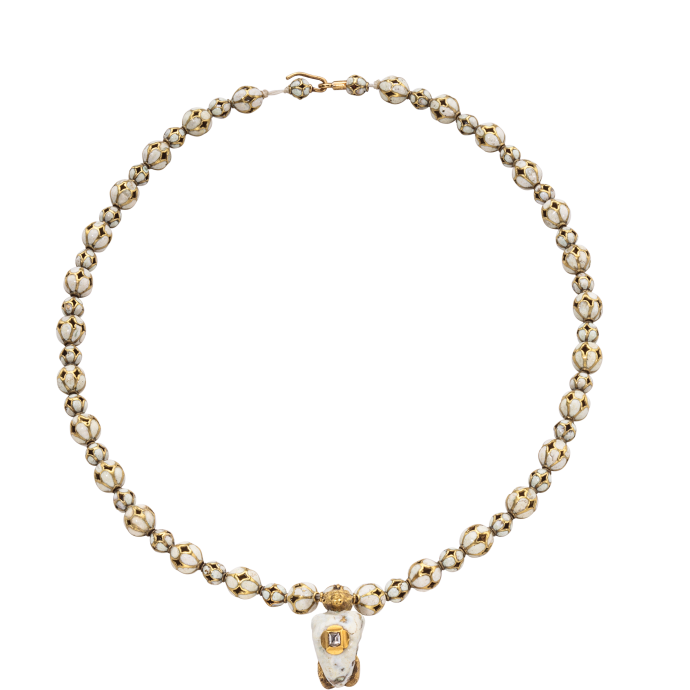


Renaissance Enamel Necklace with Satyr Pendant
, c. late 16th century




Renaissance Enamel Necklace with Satyr Pendant
Description
Once worn hanging on pearly white skin within the open square of a lady’s dress, this extraordinarily necklace is a veritable tour de force. Of the most intricate design and the finest workmanship, the delicate gold chain is composed of openwork beads, like petals of flowers, that are meticulously enameled opaque white with mottled red dots. Suspended from the chain, to which he is ingeniously attached by his tail, a satyr contorts his body, folding backward to grasp his legs with his hands. A large table-cut diamond in a box setting sits squarely on his stomach.
No single object offers a more vivid witness to the link between the goldsmith’s workshop and the sculptor of the High Renaissance. Shimmering in white enamel and gold, the tiny contorted satyr displays all the monumentality of the half-human, half-animal bronzes attributed to Andrea Riccio (1470-1532) and his circle, a master sculptor who was Michelangelo’s contemporary.
Although comparisons exist with late Renaissance figural pendants executed in émail en ronde bosse, thought to be either French or Italian in workmanship, as well as with Baroque gemstone vases and jugs from the time of Louis XIII (1601-1643) and Anna of Austria (1601-1646), the present remarkable necklace survives as a unique and extremely rare work that can only have been the creation of a master goldsmith. Its original owner was surely of high standing.
Literature
Compare the pendant design to a winged mermaid in the Medici collection, in the Museo degli Argenti, Florence (exh. cat. I gioelli dell’Elettrice Palatina 1988, no. 17; Sframeli 2003, no. 77) or merman in the treasury of Rosenborg Castle, Copenhagen (Hein 2009, no. 350). For the ornamental figures found on early seventeenth-century elaborate mounts of gemstone vases and jugs see the Musée du Louvre, Paris (exh. cat. Un temps d’exubérance 2002, nos. 169 and 170).
Provenance
European Private Collection